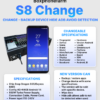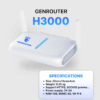In the developing digital technology era, proxies are becoming increasingly popular and play an important role for individuals and businesses operating on the internet. The two most popular types of proxies today are Residential Proxy and Datacenter Proxy. So, what is a residential proxy? What is a datacenter proxy? What are the similarities and differences between them? This article from GenFarmer will help you learn more about these two types of proxies and point out why residential proxy is often rated higher.
What is a Residential Proxy?
A residential proxy is a type of IP address provided by Internet Service Providers (ISPs) to individual users. These IP addresses are associated with real households, hence they are also called “residential IPs”. When you use a residential proxy, your internet traffic is routed through the device and network connection of a real user. A residential IP address looks like a regular individual user’s IP address, so they are very difficult to detect and block by security systems.
Residential proxies are often used to access websites and online services that have anti-scraping measures, bypass geo-blocking, manage brand reputation, conduct market research, verify ads, and for many other purposes. The biggest advantages of a residential proxy are its high anonymity and excellent accessibility to the target.

What is a Datacenter Proxy?
A datacenter proxy is a type of IP address provided by servers located in data centers, not associated with real users. These IP addresses are created for the specific purpose of accessing the internet. Typically, many datacenter IP addresses are created from the same subset, making them easily detectable as a proxy by websites and security systems.
Datacenter proxies are usually cheaper, faster, and easier to deploy than residential proxies. However, due to their nature of not being from real users, datacenter proxies can be detected and blocked by websites. Datacenter proxies are suitable for simple tasks that do not require a high level of anonymity and accessibility, such as managing multiple social media accounts, basic data scraping, or competitive SEO analysis.

Comparison of Pros and Cons of Residential Proxy and Datacenter Proxy
When comparing Residential Proxies and Datacenter Proxies, each type has its own pros and cons. Below is a comparison table of the pros and cons of Residential Proxy and Datacenter Proxy:
| Criteria | Residential Proxy | Datacenter Proxy |
| Anonymity | Much higher due to using real user IP addresses Difficult to be detected by security systems, firewalls | Lower due to the centralized nature of IP addresses Easily considered fraudulent |
| Speed | Slower than datacenter proxy Still meets most usage needs well | Faster as it is optimized for internet access purposes |
| Accessibility | Less likely to be blocked due to using real user IPs Bypasses anti-crawler, geo-blocking barriers well | More likely to be blocked Difficult to bypass security measures, access restrictions |
| Cost | Considerably more expensive than datacenter proxy Due to limited supply and high creation costs | Much cheaper than residential proxy |
| Reliability | Higher connection quality and reliability Less likely to be banned, have sudden connection drops Screened and carefully vetted by the provider | Lower quality and reliability Higher risk of being banned or losing connection midway |

Why are Residential Proxies rated better than Datacenter Proxies?
Why are Residential Proxies favored over Datacenter Proxies?
Datacenter proxies are proxies created from data centers in a specific region. The characteristic of this type of proxy is that all IP addresses are concentrated in a single location on the map, which can lead to many IPs sharing the same physical address.
Meanwhile, Residential Proxies use actual IP addresses from residential areas, including specific information such as house number, street, and are issued by Internet Service Providers (ISPs). When using a Residential Proxy, your computer connects directly to a home address, while hiding your actual location. Because Residential Proxies provide legitimate IP addresses distributed across the map, they are less likely to be blacklisted on websites. If a website owner checks the proxy, they will see that this IP address belongs to a real ISP in a residential area, rather than coming from a data center where thousands of proxies are continuously generated. This helps a Residential Proxy look like the activity of a regular user on the network.
Conversely, Datacenter proxies do not come from internet service providers but from third parties. These proxies are completely unrelated to your internet connection, but are just IP addresses provided by the data center. Therefore, Datacenter Proxies are completely separate from residential areas and ISPs.
However, Datacenter proxies also have advantages that Residential Proxies do not. With Datacenter proxies, you can buy in large quantities, providing many separate IP addresses. Each proxy will have an independent IP address, helping to protect your identity when connecting to servers.
Although Datacenter proxies have certain advantages, Residential Proxies are still preferred because of their higher legitimacy and reliability. Therefore, many proxy providers mainly offer Residential Proxies, although some also offer both Residential and Datacenter Proxies, allowing users to choose the proxy package that best suits their needs. Each type of proxy has its own pros and cons.

Conclusion
Hopefully, through this article, you have a clear understanding of Residential Proxy and the difference between Residential Proxy and Datacenter Proxy. Depending on your purpose of use and budget, you can make the most suitable choice of proxy type for yourself.
If you are looking for a solution to manage accounts and operate a phone farm or box phone farm safely and effectively, try the GenFarmer platform. With GenFarmer, managing a series of accounts on all platforms, protecting security, and preventing account locks will become easier than ever.











